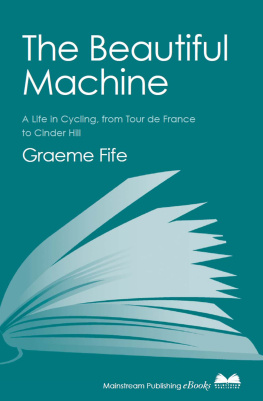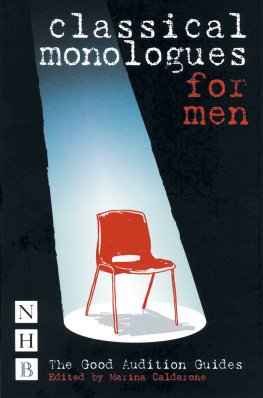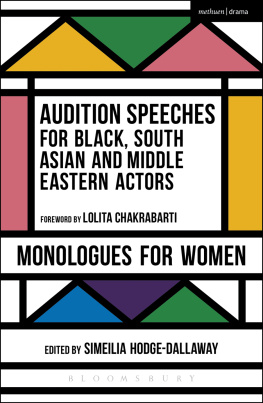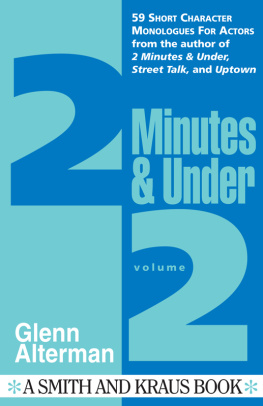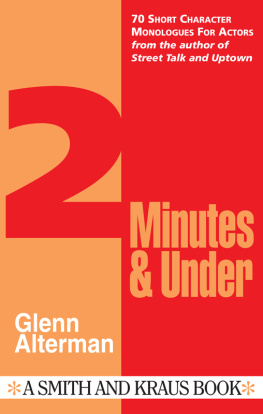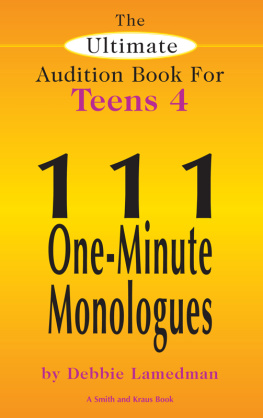Fife - One on one: the best monologues for mature actors
Here you can read online Fife - One on one: the best monologues for mature actors full text of the book (entire story) in english for free. Download pdf and epub, get meaning, cover and reviews about this ebook. City: New York, year: 2015;2016, publisher: Applause Theatre & Cinema Books, genre: Art. Description of the work, (preface) as well as reviews are available. Best literature library LitArk.com created for fans of good reading and offers a wide selection of genres:
Romance novel
Science fiction
Adventure
Detective
Science
History
Home and family
Prose
Art
Politics
Computer
Non-fiction
Religion
Business
Children
Humor
Choose a favorite category and find really read worthwhile books. Enjoy immersion in the world of imagination, feel the emotions of the characters or learn something new for yourself, make an fascinating discovery.

One on one: the best monologues for mature actors: summary, description and annotation
We offer to read an annotation, description, summary or preface (depends on what the author of the book "One on one: the best monologues for mature actors" wrote himself). If you haven't found the necessary information about the book — write in the comments, we will try to find it.
Fife: author's other books
Who wrote One on one: the best monologues for mature actors? Find out the surname, the name of the author of the book and a list of all author's works by series.
One on one: the best monologues for mature actors — read online for free the complete book (whole text) full work
Below is the text of the book, divided by pages. System saving the place of the last page read, allows you to conveniently read the book "One on one: the best monologues for mature actors" online for free, without having to search again every time where you left off. Put a bookmark, and you can go to the page where you finished reading at any time.
Font size:
Interval:
Bookmark:
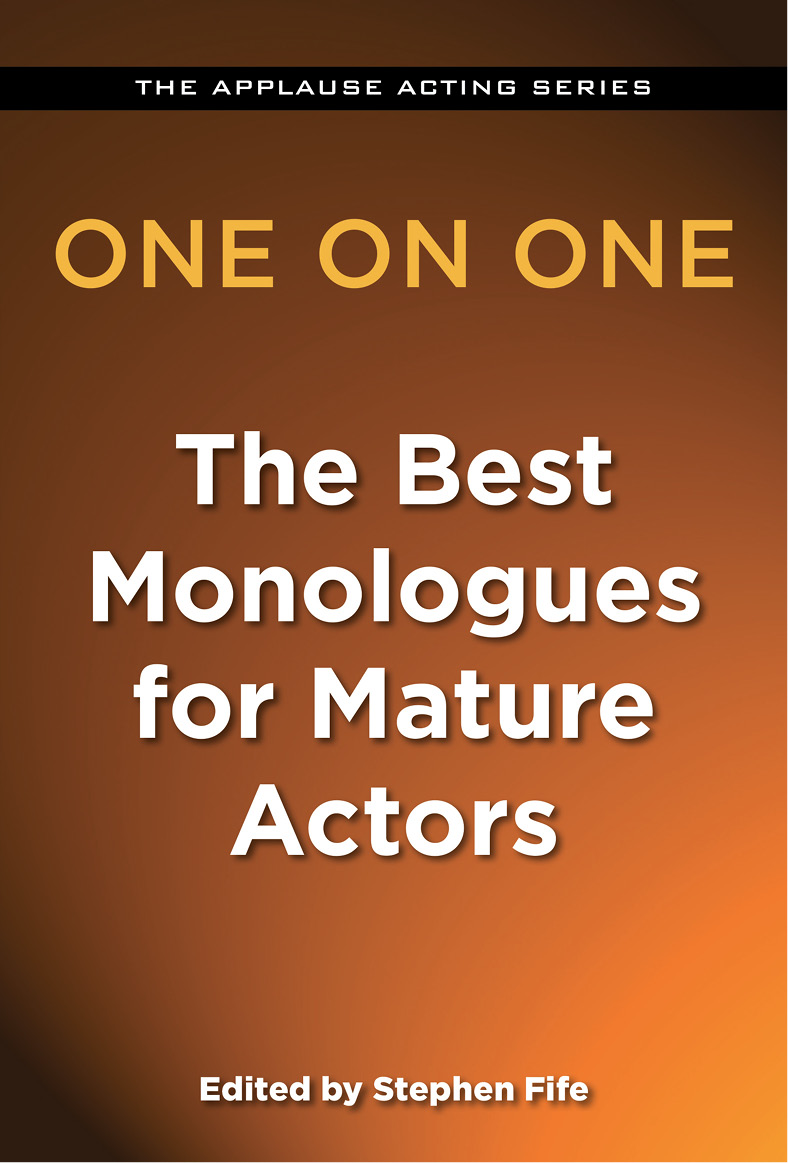
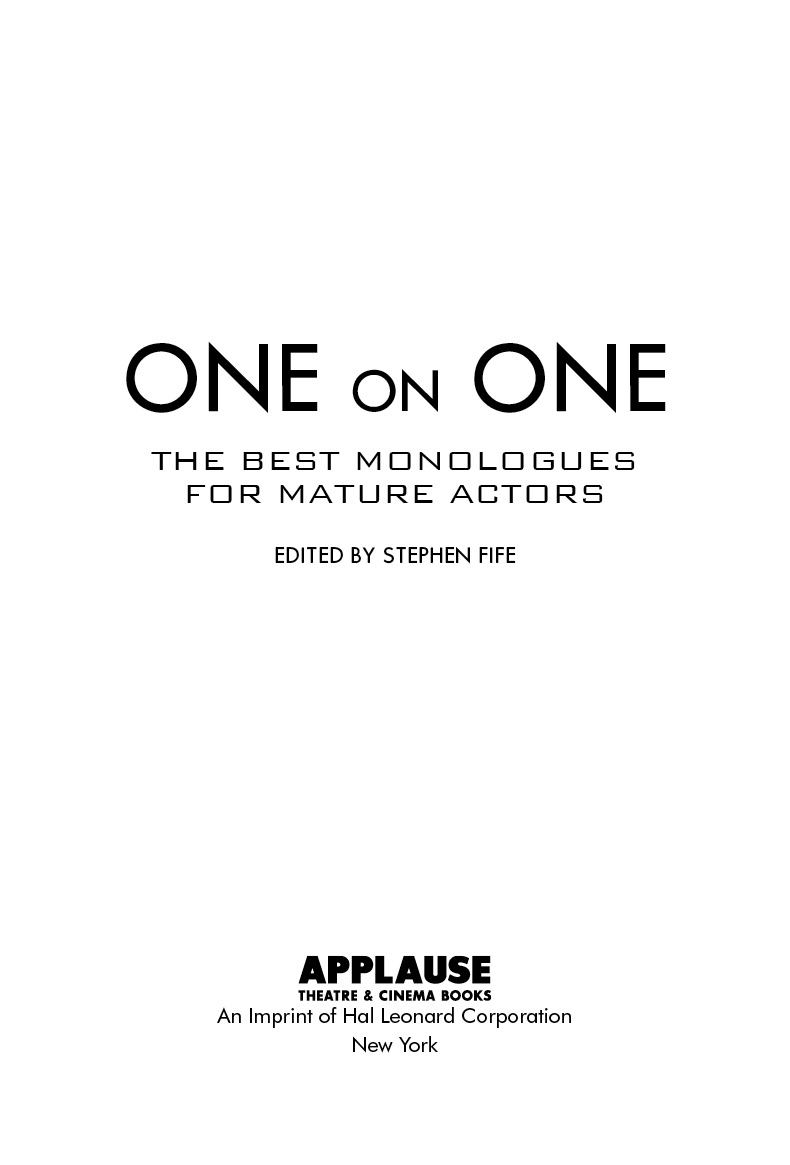
Copyright 2015 by Stephen Fife
All rights reserved. No part of this book may be reproduced in any form, without written permission, except by a newspaper or magazine reviewer who wishes to quote brief passages in connection with a review.
Published in 2015 by Applause Theatre & Cinema Books
An Imprint of Hal Leonard Corporation
7777 West Bluemound Road
Milwaukee, WI 53213
Trade Book Division Editorial Offices
33 Plymouth St., Montclair, NJ 07042
Play Sources, Permissions, and Acknowledgments can be found , which constitute an extension of this copyright page.
Printed in the United States of America
Book design by Kristina Rolander
Library of Congress Cataloging-in-Publication Data
One on one : the best monologues for mature actors / edited by Stephen Fife.
pages cm. (The Applause acting series)
ISBN 978-1-4803-6019-8
1. Monologues. 2. ActingAuditions. 3. Older peopleDrama. 4. American drama21st century. I. Fife, Stephen, editor.
PN2080.O558 2014
808.8245dc23
2014020450
www.applausebooks.com
Contents
PART ONE:
Monologues for Women
by Euripides, trans. by Philip Vellacott
by William Shakespeare
by Euripides, trans. by David Grene
by William Shakespeare
by John Webster
by Maria Irene Fornes
by A. R. Gurney
by John Guare
by Jane Anderson
by Molire, trans. by Richard Wilbur
by John Henry Redwood
by Samuel Hunter
by Velina Hasu Houston
by Tina Howe
by Anton Chekhov, trans. by Jean-Claude van Itallie
by Jeffrey Sweet
by Thomas Gibbons
by Casey Kurtti
by Edward Albee
by Lynn Nottage
by Joyce Carol Oates
by Maria Irene Fornes
by Eugene ONeill
by Wallace Shawn
by Caryl Churchill
by Nina Shengold
by Edward Albee
by Thornton Wilder
by Donald Margulies
by Eve Ensler
by John Patrick Shanley
by John Henry Redwood
by Sam Shepard
by Wallace Shawn
by Stephen Adly Guirgis
by Tennessee Williams
PART TWO:
Monologues for Men
by Euripides, trans. by David Grene
by John Guare
by William Shakespeare
by Laura Marks
by George Bernard Shaw
by Aeschylus, trans. by David Grene
by Athol Fugard
by William Shakespeare
by Donald Margulies
by Christopher Marlowe
by A. R. Gurney
by Stephen Fife
by Anton Chekhov, trans. by Jean-Claude van Itallie
by Christopher Durang
by Sarah Ruhl
by Joyce Carol Oates
by Arthur Kopit
by John Patrick Shanley
by August Wilson
by Philip Kan Gotanda
by Herb Gardner
by Shem Bitterman
by Craig Lucas
by Tennessee Williams
by William Shakespeare
by Matthew Lopez
by Anton Chekhov, trans. by Jean-Claude van Itallie
by David Mamet
by William Shakespeare
by Arthur Miller
by Lisa DAmour
by Sam Shepard
by August Wilson
by Lynne Alvarez
by Stephen Fife
by Carson Kreitzer
by Molire, trans. by Richard Wilbur
by Christopher Durang
by Eugene ONeill
by Phillip Hayes Dean
by Arthur Kopit
by August Wilson
by Jerry Sterner
by Tom Stoppard
by Arthur Miller
When Applause first asked me to edit both a monologue and a scene book for mature actors, I had some hesitation.
I figured that mature was a code word for old, which meant that the starting age for characters would likely be around fifty-five or sixty. A few characters from well-known plays came to mind right away: George and Martha from Edward Albees Whos Afraid of Virginia Woolf? , King Lear from Shakespeares eponymous play, and Mrs. Warren from George Bernard Shaws Mrs. Warrens Profession , not to mention Winnie from Happy Days and Krapp from Krapps Last Tape , both by Samuel Beckett. But would there be enough interesting characters from published plays (a criteria) to fill one book, much less two?
But then Applause informed me that the minimum age for mature characters was in fact going to be forty years old. This opened up a huge swath of other plays that could now be considered. In the end, I decided against using material from any of the characters who had first come to my mind, feeling that these monologues were already sufficiently anthologized. I was hoping to find pieces that were less familiar, characters who could live beside George and Martha and Winnie and King Lear as avatars of aging, while also including others who reflected the youthful pursuits of the matureour immaturity, if you will.
The fact is, age itselfthat is, the concept of aginghas changed drastically in recent times. People live longer than ever, through a combination of modern medicine and healthier lifestyles. Not only that but there is an expectation of maintaining a high quality of life for a longer time than evercertainly through ones seventies, even eighties. At the same time, the focus on youth culture (at least here in the USA) has never been more intense, with figures like Justin Bieber and Miley Cyrus and One Direction (soon to be replaced by new paragons of young-ness) dominating the headlines. Men over forty still do their best to forestall age by pursuing fleeting images of their youth, while women over forty are still too often ignored or taken for granted. The salient fact, though, is that being over forty now can mean many differentoften contradictorythings, and the age-old stereotypes of old age dont really apply anymore.
So when I went looking for monologues from published plays for this book, I did my best to find pieces that reflected a variety of personal experience, along with a sense of all the social upheavals that have influenced the lives of those who are forty and oldera group so often misleadingly depicted as set in our ways. In addition, having spent a few years early on as a working actorand having participated in many auditions as a playwright, director, producer, literary manager, friend, or consultantI sought out monologues that I hoped would give performers (and would-be performers) active material to work from that could show off their strengths. That is, an audition is a one-to-three minute opportunity to impress a few strangers with how special you are, how you are the one and only person who is right for the role in question. In order to do this, actors need a monologue with a strong actionlike Big Daddys explosive rage or Eve Enslers lament for a successful womans obsession with body imageto provide a way to showcase the distinctive expressivity each performer is capable of. It seems to me that such qualities could also make these monologues useful for acting classes. I certainly hope so.
Frequently auditions require actors to bring in monologues from classical plays, so I have included a sprinkling of such pieces to choose from. I want to emphasize that there is an abundance of great monologues from the plays of Sophocles, Aeschylus, Euripides, Plautus, Aristophanes, Shakespeare and his contemporaries, John Webster and his contemporaries, Molire, Goldoni, Goethe, Schiller, Corneille, and so many others. I encourage actors to immerse yourselves in such treasures to find (and even self-adapt) the material that works best for you. The same goes for the other monologues in the bookalways read the entire plays. You never know what new ideas for character actions this might provide.
Finally, one more note on the subject of age90 percent of the plays I researched for monologues did not specify the ages of characters over thirty. Certainly Shakespeare and Molire rarely do. Even contemporary mainstays like Tennessee Williams and Arthur Miller will often refer to a character merely as middle-aged or no longer young. In other cases, characters are referred to as late thirties in plays from a decade or two ago. In some of these plays, I felt that these designations were arbitrary and could equally be applied to someone in his or her forties. In other cases, I felt that a man or woman of forty-plus could just as easily be considered in casting the role. (I dont believe, however, that this is universally true; your friends may tell you that can still pass for twenty-eight, but that doesnt mean that its a good idea to show up for auditions for characters who are announced as twenty-five to thirty. In fact, that can be a sure way to get a negative mark placed next to your name by an impatient casting director.)
Font size:
Interval:
Bookmark:
Similar books «One on one: the best monologues for mature actors»
Look at similar books to One on one: the best monologues for mature actors. We have selected literature similar in name and meaning in the hope of providing readers with more options to find new, interesting, not yet read works.
Discussion, reviews of the book One on one: the best monologues for mature actors and just readers' own opinions. Leave your comments, write what you think about the work, its meaning or the main characters. Specify what exactly you liked and what you didn't like, and why you think so.




